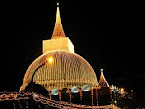The one who wish to learn Abhidhamma in depth and expecting to apply it to understand and answer intricate questions of world and living beings must first by-heart 89 or 121 types of Chiththas with their proper meanings, functionality and applicability. Similarly, 52 types of Chethasikas are also to be by-hearted with an understanding of their meaning and applicability in various Chiththas at different situations. From this episode onward, the 52 types of Mental States would be described quite in detail.
Annasamana Chethasikas
Universals – Sabba Chiththa Sadharana Chethasika (7)
It was mentioned in the previous episode that there are 13 Chethasikas which arise both with Kusala & Akusala Chiththas and they are known as Annasamana Chethasikas. The first category of Annasamanas is 7 types of “Universal Mental States” or Sabba Chiththa Sadharana Chethasika named as such as though they are found in every Chiththa in common. Seven of them are;
- Phassa – Contact
- Vedhana – Feeling
- Sanna – Perception
- Chethana – Volition
- Ekaggatha – One-pointedness
- Jivithindriya – Psychic life
- Manasikara – Attention
(1) Phassa – Contact
When describing Chiththas it was mentioned that consciousness arises when one of our six sense organs met with an object. The mental state or the Chethasika which arise, when an object present itself to the consciousness through one of the six senses is “Contact” or Phassa.
(2) Vedhana – Feeling
Recall that every Chiththa was associated or connected with mental or physical feelings of Somansassa (Pleasure), Dhomanassa (Displeasure), Upekkha (Indifference) and Dhukka (Pain), Sukha (Happiness). The feeling described there was the second universal mental state and that is called as “Feeling” or Vedhana.
(3) Sanna – Perception
Sanna or “Perception” in this context is the mental state which recognizes a particular object and its characteristics differentiated from another. When consciousness acquires an object Sanna is the mental state which identifies the nature of that object based on previous perceptions and the one which would record features for future perceptions.
(4) Chethana – Volition
Chethana or Volition plays a predominant part for every action one performs. Chethana fulfils its own function in raising the consciousness and coordinates other mental states as well. Chethana is the effort to perform any action. Kamma happens based on the Chethana preceded by the time one is performing any action. Therefore Chethana is a compulsory mental state arises with any Chiththa.
(5) Ekaggatha – One-pointedness
In order for a consciousness to arise at least for a fraction of a moment mind should be focused on one object. That mental state is known as “One-pointedness” or Ekaggatha. When an aspirant is achieving Jhana states this is one of the mental states improved to obtain extensive concentration on one particular object.
(6) Jeevithindriya – Psychic life
Not only mind but also the matter depends on Jeevithindriya and Jeevithindriya depends on mind and matter. This mental state provides life for Chiththa and Chethasika just like food provides life for our body. It will help Chiththa – Chethasika generations to exist until attaining Nibbana.
(7) Manasikara – Attention
Turing the mind towards the object is the chief characteristic of “Attention” or Manasikara. Therefore there is no mind without Manasikara. It directs the mind towards the object over and over again as and when mind leaves the object.
It should be now clear that the above mental states are compulsory to be associated with any consciousness. The next 6 Annasamanasas are particulars which contains in Chiththas depending on the situation. Next episode would describe Prakirnaka Chethasikas or Particulars in detail.









0 comments:
Post a Comment